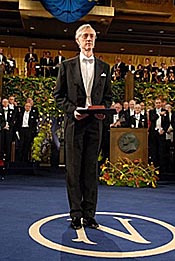Feature
Big-Bang Work Brings Big Prize
05.07.07
| Who are NASA's Space Science Explorers? Who are NASA's Space Science Explorers? The scientist studying black holes in space. The teacher talking about the secrets of the cosmos. And the student asking if there is life away from Earth. All of these people are Space Science Explorers. They are all curious about our solar system and space. This is a story about a NASA Space Science Explorer. Nominate a Space Science Explorer! Tell us about the Space Science Explorers you know. We're looking for students, teachers, scientists and others who have a connection to NASA, whether they work for the agency or are involved in a NASA-supported mission or program. Send your nominations to Dan Stillman: dan_stillman@strategies.org. |

|
John planned for his satellite to look out into space. COBE would look for clues about how the planets and universe were born. Most scientists think the universe was created from a big explosion. But they can't be sure. The explosion would have taken place billions of years ago. Scientists call this explosion the big bang.
Image to right: John Mather receives the Nobel Prize for Physics. Copyright: The Nobel Foundation 2006. Credit: Hans Mehlin
John and a whole team of people started building COBE in 1982. It took them several years to finish it.
COBE finally went into space in 1989. Soon, COBE found exactly what John was looking for. It told scientists a lot about how the universe began. The satellite found strong proof for the big bang.
John was surprised that COBE found just what he thought it would. Science doesn't always work that way. This time it did. COBE did such a great job that John won an award. He was given a Nobel Prize in 2006. The Nobel Prize is one of the best prizes that a scientist can win.
|
Related Resources + Previous Space Science Explorers articles |
He said, "Being a scientist is one of the most exciting things that I could imagine doing."
Adapted for grades K-4 by Dan Stillman, Institute for Global Environmental Strategies